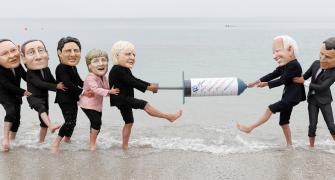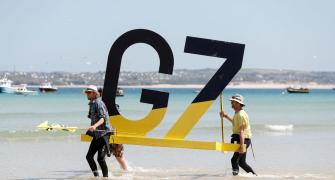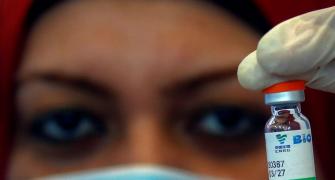As Biden moves ahead with a new 'strategic concept' for China and Russia, the going is bound to get rough for the US and its G7 partners, notes Ambassador T P Sreenivasan.
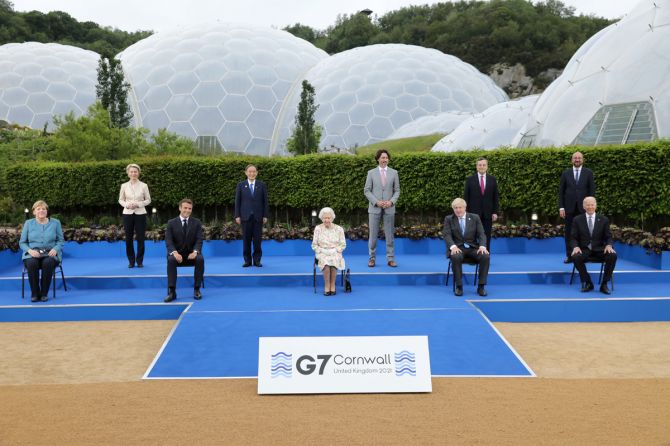
COVID-19, like death, has turned out to be a leveller as the leaders of the world's wealthiest nations struggled to deal with their vulnerabilities at a G7 summit just concluded at Carbis Bay in the English holiday region of Cornwall.
In their first face-to-face meeting since the pandemic began, they appeared unsure of maintaining their leadership of the world in the face of an unpredictable pandemic, an antagonistic China and a defiant Russia.
The return of the United States, though diminished by Donald Trump and a dreaded disease, to the fold breathed a whiff of fresh air into the group.
President Biden appeared weak and unsteady, but his determination to recapture the leadership of the world by strengthening alliances and confronting adversaries was palpable.
The group was energised into taking quick decisions, not from a position of strength and confidence, but in a desperate bid to avert a disaster in the aftermath of the pandemic, the looming danger of climate change and the threat from China and Russia which had sharpened their antagonism in the shadow of the pandemic.
Although it was evident that the key to the future was vaccinating the whole world, the decisions taken on this crucial issue were too little too late.
They vowed to share vaccine doses with poorer nations that urgently needed them.
This was not charity, but a dire need of the group itself to prevent more waves of infection.
All that the group pledged was 1 billion doses, with half of that coming from the United States and 100 million from Britain.
The number of doses was far too low to vaccinate 70% of the world population, without which the much desired herd immunity cannot be ensured.
Moreover, finance and logistical help are needed to get the vaccines delivered and administered in the farthest corners of the globe.
The rules of WHO were framed on the presumption that pandemics might come from the developing world to the wealthy nations, but the journey of COVID-19 in the opposite direction demanded a total change in extending support to the developing countries.
Heeding the advice of Prince Charles that G7 should give equal attention to climate change, G7 pledged to make themselves carbon free by 2050 and to provide technology and funding to the developing countries to help them reduce greenhouse gas emissions.
The 'Build Back Better for the World' plan to help speed up the global shift to renewable energy appears to be aimed at countering China's belt and road initiative, which was recognised as part of Chinese expansionism.
The G7 communique reaffirmed its commitment to 'jointly mobilise $100 billion per year from public and private sources, through to 2025', which may help the negotiations leading to the Glasgow conference in November 2021.
The plan to persuade all countries to commit themselves to a date to make themselves carbon free will not materialise without transfer of technology and financing.
China and Russia loomed large as adversaries in formal and informal discussions.
The leaders criticised China over human rights in its Xinjiang region, called for Hong Kong to keep a high degree of autonomy and demanded a full and thorough investigation of the origins of the coronavirus in China.
As expected, China reacted sharply to these demands and warned that the days when a small group of countries dictating to the world were over.
The US-Russia summit so soon after the G7 summit generated interest in the leaders.
Comments made by Presidents Biden and Putin about each other were mixed, but there was agreement that the exit of President Trump was a positive factor.
But the overall prospects of the summit remain ominous as President Biden harped on Russian interference in the 2016 elections, President Putin's dictatorial ways and the fate of Alexei Navalny.
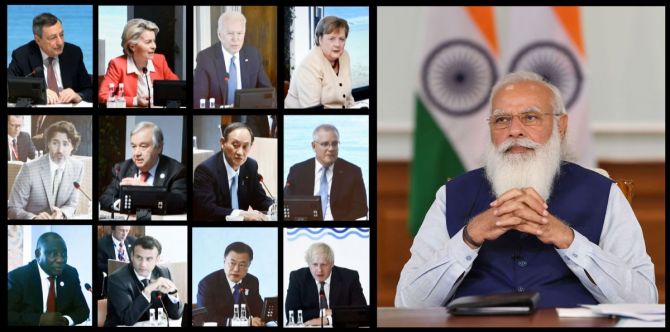
In a landmark decision, the G7 endorsed an agreement struck by their finance ministers earlier to adopt a minimum floor for corporation tax of 15 per cent.
'We have taken a significant step towards creating a fairer tax system fit for the 21st century, and reversing a 40-year race to the bottom,' the G7 said in their concluding statement.
'Our collaboration will create a stronger level playing field, and it will help raise more tax revenue to support investment and it will crack down on tax avoidance.'
Experts say that this move will benefit India as the effective domestic tax rate is above the threshold, and the country would continue to attract investment.
Among the special invitees, India was the most prominent, particularly because of the reported concerns in the West about the direction India was taking.
Prime Minister Modi was categorical in asserting that G7 was our natural ally and reiterated India's commitment to democracy, freedom of thought and liberty.
'Was happy to address the @G7 Session on Open Societies as a Lead Speaker. Democracy and freedom are part of India's civilizational ethos, and find expression in the vibrancy and diversity of India's society,' PM Modi said in a tweet.
On climate change, the PM called for collective action, recognizing that this challenge can't be addressed in silos. He shared that India is the only G20 country on track to meet its Paris commitments, according to the MEA.
The PM also highlighted the importance of the International Solar Alliance.
The G7 communique contains a six point agenda relating to the pandemic, reinvigorating economies, securing prosperity, protecting the planet, strengthening partnerships and embracing values.
'We shall seek to advance this open agenda in collaboration with other countries and within the multilateral rules-based system. In particular, we look forward to working alongside our G20 partners and with all relevant International Organisations to secure a cleaner, greener, freer, fairer and safer future for our people and planet,' G7 proclaimed.
The optimism is reasonable, but as President Biden moves ahead with a new 'strategic concept' for China and Russia, the going is bound to get rough for the US and its G7 partners.
Ambassador T P Sreenivasan (IFS 1967) is a former Ambassador of India and Governor for India of the IAEA.
A frequent contributor to Rediff.com, you can read his fascinating columns here.
Feature Presentation: Aslam Hunani/Rediff.com

